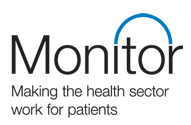Related Research Articles

The Department of Health and Social Care (DHSC) is a ministerial department of the Government of the United Kingdom. It is responsible for government policy on health and adult social care matters in England, along with a few elements of the same matters which are not otherwise devolved to the Scottish Government, Welsh Government or Northern Ireland Executive. It oversees the English National Health Service (NHS). The department is led by the Secretary of State for Health and Social Care with three ministers of state and three parliamentary under-secretaries of state.
An NHS foundation trust is a semi-autonomous organisational unit within the National Health Service in England. They have a degree of independence from the Department of Health and Social Care. As of March 2019 there were 151 foundation trusts.

Monitor was an executive non-departmental public body of the Department of Health, responsible between 2004 and 2016 for ensuring healthcare provision in NHS England was financially effective. It was the sector regulator for health services in England. Its chief executive was Ian Dalton and it was chaired by Dido Harding. Monitor was merged with the NHS Trust Development Authority to form NHS Improvement on 1 April 2016.
The Healthcare Commission was a non-departmental public body sponsored by the Department of Health of the United Kingdom. It was set up to promote and drive improvement in the quality of health care and public health in England and Wales. It aimed to achieve this by becoming an authoritative and trusted source of information and by ensuring that this information is used to drive improvement. The Commission was abolished on 31 March 2009 and its responsibilities in England broadly subsumed by the Care Quality Commission.
Salford Royal NHS Foundation Trust operated Salford Royal Hospital in Greater Manchester until 2017. Its chief executive is Dr Owen Williams.

NHS Scotland, sometimes styled NHSScotland, is the publicly–funded healthcare system in Scotland and one of the four systems that make up the National Health Service in the United Kingdom. It operates 14 territorial NHS boards across Scotland, supported by seven special non-geographic health boards, and Public Health Scotland.
Health and Social Care is the publicly funded healthcare system in Northern Ireland. Although having been created separately to the National Health Service (NHS), it is nonetheless considered a part of the overall national health service in the United Kingdom. The Northern Ireland Executive through its Department of Health is responsible for its funding, while the Public Health Agency is the executive agency responsible for the provision of public health and social care services across Northern Ireland. It is free of charge to all citizens of Northern Ireland and the rest of the United Kingdom.

North West Boroughs Healthcare NHS Foundation Trust was an NHS foundation trust which provided mental health, learning disability and community health services in fifteen boroughs of North West England. The Trust delivered mental health and learning disability services in Halton, Knowsley, St Helens, Warrington and Wigan, as well as community-based physical health services in Halton, Knowsley, St Helens and Sefton. It also provided services to improve outcomes for people with mental vulnerabilities within the criminal justice system across Greater Manchester, working in partnership with Mitie Care and Custody and Cheshire and Greater Manchester Community Rehabilitation Company.
St Andrew's Healthcare is a large independent charity based at St Andrew's Hospital in Northampton, which provides psychiatric services. It also has sites in Essex, Birmingham and Nottinghamshire. It runs specialist services for adolescents, men, women and older people with mental illness, learning disability, brain injury, autism and dementia and hosts the National Brain Injury Centre. It is a psychiatric hospital and service provider that caters for individuals requiring inpatient care and rehabilitation, and step-down housing.
The Care Quality Commission (CQC) is an executive non-departmental public body of the Department of Health and Social Care of the United Kingdom. It was established in 2009 to regulate and inspect health and social care providers in England.

South London and Maudsley NHS Foundation Trust, also known as SLaM, is an NHS foundation trust based in London, England, which specialises in mental health. It comprises four psychiatric hospitals, the Ladywell Unit based at University Hospital Lewisham, and over 100 community sites and 300 clinical teams. SLaM forms part of the institutions that make up King's Health Partners, an academic health science centre.
Berkshire Healthcare NHS Foundation Trust provides mental health services and other community based health services, primarily to the resident population of the Royal County of Berkshire, England, in the United Kingdom.

Hinchingbrooke Hospital is a small district general hospital in Hinchingbrooke near Huntingdon, Cambridgeshire. Opened in 1983, it serves the Huntingdonshire area, and has a range of specialities as well as an emergency department and a maternity unit. The hospital is managed by the North West Anglia NHS Foundation Trust.
Avon and Wiltshire Mental Health Partnership NHS Trust (AWP) is an NHS mental health trust providing adult mental health and related services in Wiltshire and the former county of Avon, an area centred on Bristol.
Dorset HealthCare University NHS Foundation Trust provides community and mental health services across Dorset. It serves a population of almost 700,000 people, employing around 5,000 staff. The Trust's income is approximately £242.5 million.
Public Health Wales is an NHS Trust which was established on 1 October 2009 as part of a major restructuring of the health service in Wales. It aims to protect and improve health and wellbeing and reduce health inequalities in Wales.
The Association of Independent Healthcare Organisations was formed in April 2013 by a merger between the Private Hospitals Association and Independent Healthcare Advisory Services as a trade association for independent healthcare organisations.
Healthcare in London, which consumes about a fifth of the NHS budget in England, is in many respects distinct from that in the rest of the United Kingdom, or England.

NHS Improvement (NHSI) was a non-departmental body in England, responsible for overseeing the National Health Service's foundation trusts and NHS trusts, as well as independent providers that provide NHS-funded care. It supported providers to give patients consistently safe, high quality, compassionate care within local health systems that are financially sustainable.
The Health Services Safety Investigations Body (HSSIB) is a fully independent arm's length body of the Department of Health and Social Care. HSSIB came into operation on 1 October 2023. It investigates patient safety concerns across the NHS in England and in independent healthcare settings where safety learning could also help to improve NHS care.
References
- ↑ Healthcare Commission - Why was the Healthcare Commission set up? Archived 2007-06-26 at archive.today
- ↑ Office of Public Sector Information - Health Act 1999
- ↑ "Wedding bells and pastures new for Chief Executive" (Press release). St George's Healthcare NHS Trust. 27 April 2006. Retrieved 15 September 2008.
- ↑ "Commission for Health Improvement". chi.nhs.uk. Commission for Health Improvement. Archived from the original on 25 March 2004.
- ↑ Royal Commission on the NHS Chapter 12. HMSO. July 1979. ISBN 978-0101761505 . Retrieved 19 May 2015.